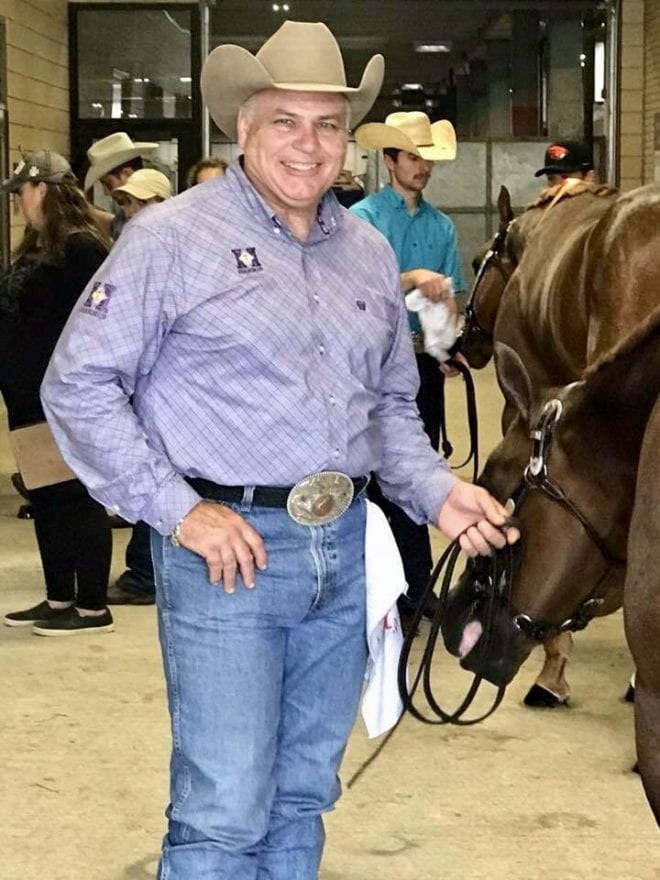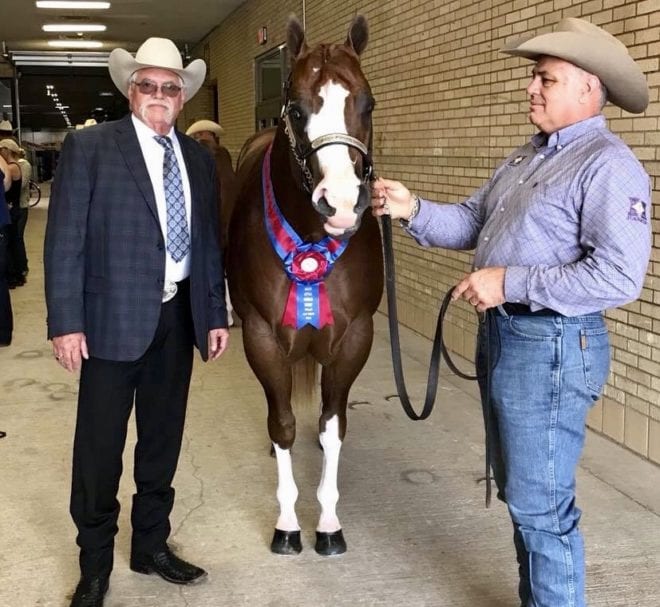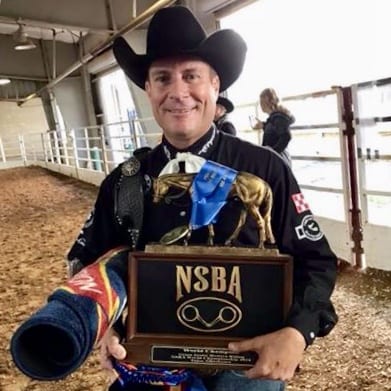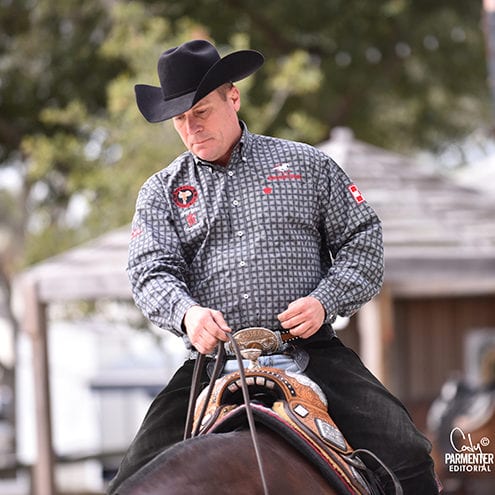The equine industry is unique. Horse trainers and exhibitors compete against one another in the arena every day, but on the outside of the show pen, it is generally one big family.
Trainers want to help each other to grow and improve our industry every day. They collaborate with one another on the best feed, ways to fit their horses, training techniques and more.
We wanted to see how specific trainers work with others to enhance their program. Charlie Cole, Sandy Campbell Jirkovsky and Dewey Smith gave insight into how they utilize fellow trainers and the benefits it provides them. They also discussed the importance of being an assistant trainer as part of the overall educational experience.
Collaboration
Trainers can be found in areas all across the United States. Traveling to horse shows is an excellent opportunity for them to see others who may live 20 + hours away. Dewey Smith uses horse shows as a way to learn from other trainers.
 “We get together and talk about things,” Smith (right) said. “The main thing with halter horses is structure. If you don’t have structure, you don’t have anything. We talk about structure and how everyone fits their horses. We ask if there is anything new on the market, feed-wise, that might benefit us. It’s a very competitive business, but yet we are all friends and want to get along. If there is something that we have found that is working well, we want to pass it along and let others know. You are only competing in the arena, not outside. On the outside, you need to be friends and get along.”
“We get together and talk about things,” Smith (right) said. “The main thing with halter horses is structure. If you don’t have structure, you don’t have anything. We talk about structure and how everyone fits their horses. We ask if there is anything new on the market, feed-wise, that might benefit us. It’s a very competitive business, but yet we are all friends and want to get along. If there is something that we have found that is working well, we want to pass it along and let others know. You are only competing in the arena, not outside. On the outside, you need to be friends and get along.”
Texas can be considered the hub of the horse world. It is such a massive state with trainers everywhere. Sandy Jirkovsky has used her location in Texas as a resource. She gives her customers the ability to hear what other trainers have to say by bringing them in for a clinic type session.
“I have trainers come in and help my clients for new ideas,” Jirkovsky said. “I do that on a quarterly basis to get new ideas coming in for my people and myself. It is like a clinic. They come in and work showmanship and horsemanship one day. They may say some of the same stuff we say, but it is still in another person’s opinion. That helps all of us. Our clients like it. Moving to Texas has been great because of the ability to ride with other trainers or have them come in and help. In Nebraska, we were pretty isolated and had to wait until the shows to ask for help from people or bounce ideas off each other.”
Each trainer has their own style and technique. They specialize in specific disciplines and are experts in their avenue. Some trainers collaborate by each of them training a horse for different events. Charlie Cole of Highpoint Performance Horses is currently doing this with a fellow trainer.
“We have worked with many trainers over the years in all different disciplines,” Cole said. “Currently, I’m sharing Kaleena Weakly’s great horse, HP Prime Time, with Jason Gilliam. Jason does most of the training, and I’m doing the western riding. Communication is great with Jason and Kaleena, and we all have the horse’s best interest in mind.”
The Support Group
 Having a solid support system to back you up is essential with any career. The trainers in the equine industry are there for each other in every aspect. Jirkovsky (left) is lucky enough to have great friends and family to lean on in the horse world.
Having a solid support system to back you up is essential with any career. The trainers in the equine industry are there for each other in every aspect. Jirkovsky (left) is lucky enough to have great friends and family to lean on in the horse world.
“I have a good support group,” Jirkovsky said. “I have some good friends and if I run into a problem, I have help. I depend on my brother a lot for an outside opinion. It used to be my dad, but since he has passed away, Butch and I became very close. I’ll have him come over or any trainers in the area when I have a problem. My first go-to person is almost always my brother. I do send horses to other trainers sometimes. Not every horse fits every program. I’m not opposed to sending one to somebody else.”
Horses are incredible athletes with individualized talents. Trainers try to find the best job for each horse. Some horses can become problematic until they find their best job. Cole works hard to give those horses something new to do to change their attitude. “More often than not, we get sent problem horses to give new jobs to,” Cole said. “Many times horses that are giving trainers problems are bored and adding a new event can help them.”
 You will hear many trainers say not every horse fits every program. It’s true. Some horses work great with techniques that others may dislike. Smith wants to keep every horse happy by putting them in the right program.
You will hear many trainers say not every horse fits every program. It’s true. Some horses work great with techniques that others may dislike. Smith wants to keep every horse happy by putting them in the right program.
“Any time you have a problem individual, I get on the phone and collaborate with guys and ask them about it and if they have ever had that problem,” Smith said. “We try to help each other out all that we can. I haven’t sent horses to another trainer, but I have sold horses to somebody that I thought the horse would work better with. They handle that issue well, and that has worked out well for me. Not every horse fits every program. You have to move those things around to help them. I have sent customer’s horses and sent a customer to another trainer because the horse didn’t fit us, and I thought it would fit them. They were pleased about that and came back as a customer to me later on.”
Starting Out
 The majority of trainers start their careers by being an assistant trainer and working for someone with an established program. Others grew up with parents as trainers or showed as a youth and decided to make a career out of their love for riding. Having the opportunity to work side-by-side with someone and seeing all aspects of the business is vital before starting your own business. Cole, Jirkovsky and Smith all agree that being an assistant trainer is a great start.
The majority of trainers start their careers by being an assistant trainer and working for someone with an established program. Others grew up with parents as trainers or showed as a youth and decided to make a career out of their love for riding. Having the opportunity to work side-by-side with someone and seeing all aspects of the business is vital before starting your own business. Cole, Jirkovsky and Smith all agree that being an assistant trainer is a great start.
“I think it is imperative to work for a successful trainer when starting out,” Cole (left) said. “Good advice and direction is key to a young trainer’s success.”
“I think that is the only way to start,” Jirkovsky said. “I think it is such a great opportunity. I try to not only teach them about the training and customer service part, I show them the business side too. So many of the kids don’t see the bills and the overhead. I try to get them involved in that too. A lot of kids come out of school and think they are going to ride horses and make a huge profit. They forget the business aspect of it. As the mentor for these young kids, we have to stress the business application to them too. I tell many young people to go work for someone they admire who has a good work ethic. It should be someone they have a lot of respect for. Keep your mouth shut and work hard.”
“I think it probably would have been beneficial for me,” Smith said. “I didn’t do it that way, but I think it is beneficial to do that because you can learn so much. A guy that has done this for a while has so much to give to a young person starting out. Absorbing that knowledge would be tremendous for someone starting their career.”
Trainers are one big family. They help one another, cheer each other on and push their peers to be the best they can be in the show pen.
About the Author: GoHorseShow writer, Courtney Hall is a graduate student at Missouri State University. She is obtaining a Master of Science in Agriculture degree with research in agricultural communications. She started showing the APHA & AQHA all-around circuit as a youth and continues today as an amateur.








